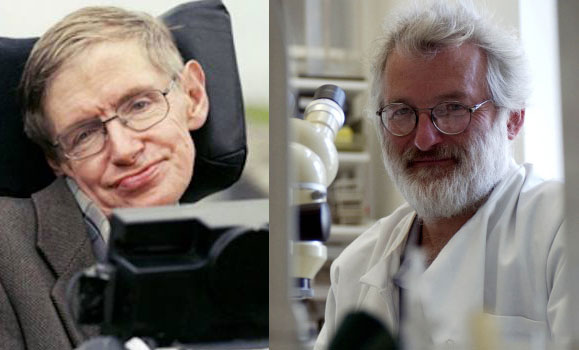News
» Go to news mainConsider this...John Sulston and Stephen Hawking: On attitudes and evidence
Today, we launch a new feature that will appear in our upcoming Mosaic newsletter — and for this one we want to hear from you! Consider This… will feature submitted commentary and perspectives from faculty members, tied to news events of the day. In this piece, Dr. Chris Simms in the School of Health Administration discusses the recent deaths of biologist and academic John Sulston and physicist Stephen Hawking within the context of evidence-based global health and research. Dr. Simms is a regular contributor to the BMJ’s Opinion and Lancet blogs and this year is publishing a collection of articles entitled “Global Health: Rising from the Domain of Losses”
If you want to contribute an article to Consider This, email healthcomms@dal.ca with your story pitch.

Earlier this month, John Sulston (biologist and academic) and Stephen Hawking (physicist and cosmologist) died. In this age of anxiety, the worry is their deaths may increase our ethical deficit – in global leadership, science-based decision-making and, pursuit of the greater good.
Both scientists have contributed to human knowledge; they have also advanced and bolstered the ideas and values underlying global health and global research – the subject at hand. For example, Stephen Hawking embraced the notion of “Cathedral Thinking” in which many disciplines work together for the greater good, taking the long-term view. He saw cathedral projects as the “modern equivalent of grand church buildings” characterized by collaboration, a shared vision and cooperation in which the ideas are started by one generation in the hope that the next will take up the challenges for the greater good. He warned that if we fail to meet today’s challenges “then the forces that contributed to Brexit, the envy, the isolationism, not just in the UK but around the world that spring from not sharing, of cultures driven by a narrow definition of wealth and a failure to divide it more fairly both within nations and across national borders, will strengthen. If that were to happen, I would not be optimistic.”
John Sulston won the Nobel Prize in 2002 for Physiology or Medicine by describing the DNA sequence of the lowly worm. This was followed by research that epitomized “cathedral thinking.” His team of 500 worked together with 20 teams across the globe to make one of the most significant scientific breakthroughs of the modern age - the sequencing of the human genome. His team mapped one third of the genome. However, arguably his greatest contribution to global health and research was to fight to keep his scientific findings in the public domain, protecting human health against corporate wealth which sought to patent and license-out the mapping. He wrote “I was amazed at the tacit acceptance by some that this information could and should be privatized. The product was not an invention: a genome sequence is a clearcut case of public domain material.” He succeeded in his fight for the greater good and spent the last decade bringing together ethics, science and the humanities.
The countervailing forces are of course, formidable. The isolationism, protectionism, nationalism and individualism have combined with a mounting public awareness of conspicuous inequalities and plummeting social trust – and these are defining the world in which we live. Two of Donald Trump’s top advisers, H R McMaster and Gary Cohn, wrote in The Wall Street Journal last year that “The president embarked on his first foreign trip with a clear eyed outlook that the world is not a ‘global community’ but an arena where nations, nongovernmental actors, and businesses engage and compete for advantage.” This month however, Cohen and McMaster, having defined this dystopian “arena,” were prompted to resign having been found insufficiently zealous.
One year ago today Stephen Hawking appeared as a hologram before an audience in Hong Kong bearing a familiar message “We are witnessing a global revolt against experts.” Indeed, science is under attack from ideologues, by global warming deniers, by anti-vaxxers, resource industries and by cherry-pickers – their task made easier by the centralization of power as contagion — in China, Russia, US, SSA and parts of Europe.
Over recent decades, global health has displaced “international health.” The reasons for the rise of the former are not necessarily the same as those that explain the decline of the latter, yet the features of each seem to explain the trajectory of both. According to the Consortium of Universities for Global Health, these would be measured against the primacy of evidence, equity, cooperation and collaboration among, multiple disciplines, a level playing field between North and South and, global health as local health. In a global community more interconnected than ever before yet more fractured, Sulston and Hawking show there is a way forward and a way backward. Choose wisely.
Related links:
- “Our attitude towards wealth played a crucial role in Brexit. We need a rethink” Stephen Hawking, The Guardian
- "The Life Scientific" BBC Radio 4, featuring John Sulston
- "A brief tribute to Sir John Sulston, champion of open science" Global Alliance for Genomics and Health
- "America first doesn't mean America alone" Wall Street Journal
- "Stephen Hawking appears as a hologram to discuss the future of science" Futurism
- “Towards a common definition of global health” The Lancet
Recent News
- Bridging continents: Dal students to learn, share and connect in West Africa
- Partnership between UpLift and Public Health sees continued funding allocated for Youth Engagement Coordinators
- Dal Health grad students use podcasting to discover the people behind the science
- Nursing student closer to living out her dream of helping people thanks to support of new award
- Master of Nursing grad passionate about working in mental health and addictions
- MSc Audiology grad shifts career from entomologist to audiologist
- Occupational Science grad exploring concept of care farming
- Dal Crossroads continues 20 year legacy of student ‑led learning
